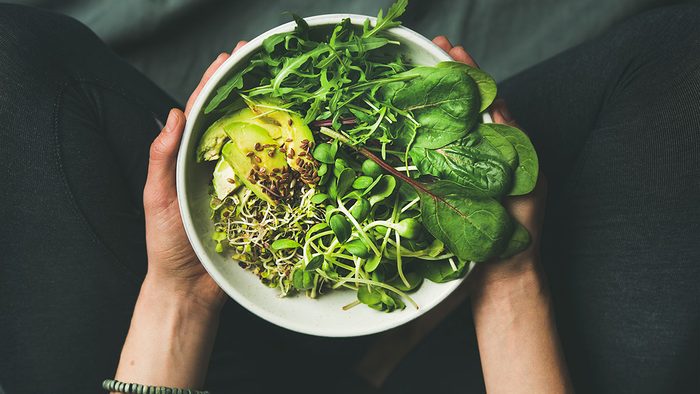
Cutting too many calories
One of the most common myths is thinking, “cut calories, lose weight,” but eating too little can actually slow your metabolism, causing the pounds to creep back on. “Even if you’re restricting calories healthfully, it’s hard to meet all your nutritional needs when you go too low,” says registered dietitian Samantha Heller, author of Get Smart: Samantha Heller’s Nutrition Prescription for Boosting Brain Power and Optimizing Total Body Health. It’s a trap she says she’s seen experts fall into, thinking that an extreme action may help “get me kick-started.”
Solution: Don’t fall for big gimmicks. Depending on your size, activity level, and other factors, dipping below 1,200 calories a day isn’t a good idea for long-term weight maintenance. (Also, these “zero calorie” foods aren’t really zero calories.)

Falling for “health halos”
So-called “healthy foods” such as green juices, whole-grain pretzels, or organic-labelled anything may coax you into eating more than you usually would. “Someone [once] brought coconut vegan donuts to a party I was hosting,” shares registered dietitian Brooke Alpert, RD, founder of B Nutritious, a private practice in New York City. “And I couldn’t help but eat one after I dropped my daughter off at school [the next day] even though I would otherwise never eat dessert at 10 in the morning. I’m proof that even professionals fall for health halos!”
Solution: Read nutrition labels, and be mindful of your choices. Ask yourself, “Am I really hungry right now? Do I need to be eating this?”

Not embracing carbs
“A common piece of advice I see others give out is to ‘scoop out your bagel’ or cut out carbs to lose weight,” says Heller. “But what’s the point of indulging in a bagel if you’re going to scoop it out?” She adds that it’s easy to overdo it with carbs, but eliminating them isn’t healthy either. “Skimping on whole grains means skimping on energy, as well as fibre, B vitamins, vitamin E, protein, and antioxidants,” Heller says. “They also help balance blood sugar highs and lows.”
Solution: Don’t ditch carbs—in fact, any plan that eliminates entire categories of nutrients is a big, fat red flag. But re-educate yourself about serving sizes (read labels, use measuring cups) to make sure you eat a reasonable amount. You may also want to know the signs that your body wants you to eat more carbs.

Believing eating at night causes weight gain
Some evidence, especially from animal studies, suggests that late-night munching isn’t good for you, but encouraging people to cut off eating at an arbitrary time isn’t a good idea either. “It’s OK if you eat dinner at 8 or 9 p.m.—you have to eat, after all,” says Heller, who’d rather people eat dinner late than skip it, and wake up famished. A bigger problem is eating all evening: nibbling when you get home from work, having dinner, then snacking while you watch TV or relax. Before you know it, you’ve munched for four hours straight. (Here are some strategies to help get your late-night cravings under control.)
Solution: Portion out specific meals on plates and eat them sitting down at the table, not in front of the TV, or standing up in the kitchen.

Getting portions wrong
No matter how healthy your meal choices, eating too much isn’t a good thing. Too many of us, health experts included, have no clue what a real portion looks like. A recommended three-ounce serving of meat, poultry, or fish is much tinier than you think—the size of a deck of cards. A cup of cereal is just the size of your fist. A half-cup of ice cream is about the size of half a baseball. “Even we don’t have X-ray eyes,” says Heller, “we’re all susceptible to environmental influences that encourage us to overeat.”
Solution: Spend a day measuring out portions to gauge just how wrong or right you really are, then course correct. Just being aware of your environmental influences can give you more control over your eating habits.

Thinking fat is the enemy
“At this point, anything low-fat makes my skin crawl,” says Alpert. “Fat is such a necessity in our diets, but people are still petrified of fat.” Alpert, who is confident that eating more healthy fat and less sugar is how we should be battling the obesity epidemic, is surprised to still see others recommending strict low-fat diets to clients.
Solution: Eat some filling, healthy fat at each meal: nuts in your breakfast cereal, an olive oil-based dressing on your salad for lunch, grilled salmon for dinner.

Being too busy to be healthy
What over-extended professional hasn’t felt like there’s no time to squeeze in a workout or eat a home-cooked meal? This can’t-do-it-all mentality affects health and nutrition experts as much as the rest of us, says Alpert. “When I start neglecting myself—skipping my morning run or spinning class—I feel it a couple of days later. I’m more lethargic, I lose my patience more easily. I have to tell myself ‘OK, mama needs to eat a salad’ to get back on track and feel better.”
Solution: Life’s busy traps ensnare the best of us. When they do, remember this mantra Alpert uses: “The healthier you feel, the better and more efficient you’ll be at your job, and the happier you’ll be with your family and friends.”
Next, don’t miss these healthy eating tips for super busy people.
